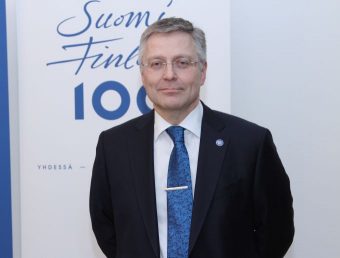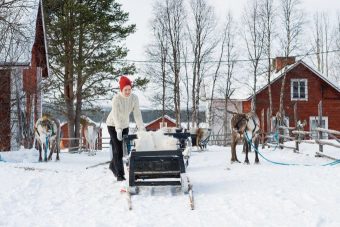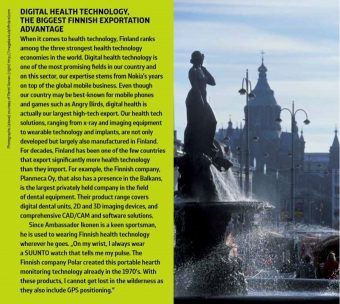
Having been investing in the health sector and environmental protection for decades, Finland is now highly ranked among the world’s leading countries with the most advanced standards of environmental protection and health technology. In a conversation with Pertti Ikonen, Finnish ambassador in Serbia, we found out what measures the Finns have applied to develop “ecological health” which involves a multidisciplinary approach in order to preserve the balance between ecology and human health and encompass many areas including recycling and energy efficiency.
EP: Is an effective Finnish environmental policy the result of the implementation of the strict EU legislation or there are some particularities in applying those standards in your country?
Pertti Ikonen: Finland has indeed been doing well in international environmental rankings. Just to name one example, by the environmental performance index (EPI) 2016, Finland is the greenest country in the world. Even though we Finns are well-known for our compliance with rules and regulations, including EU legislation, environmental protection is something that is also close to our heart. Our Nordic environment is particularly vulnerable, especially in the northernmost part of the country, Lapland, where nature can be slow to recover from any damage. It is more difficult and costly to repair any damage done to our nature than to prevent it in the first place, so therefore, we need an appropriate legislative framework to protect the sensitive environment we live in.
EP: Was it necessary to run intensive campaigns on the importance of preserving the environment as a way to keep and boost the health of the nation back at the time when Finland was about to join the EU in early 90’s?

Pertti Ikonen: Environmental protection in Finland has a longer history than our EU integration. Its roots are in the international nature conservation movement in the 1960’s that started as a reaction to worsening water and air pollution. The Ministry of Environment, with departments focused on specific aspects of conservation and nature policy, was created in 1983, twelve years before Finland joined the EU. Also, our country is limited in terms of natural resources, which has created a conservation-focused mindset and the ability to do more with less. For example, used paper has been collected in Finland for almost a century and today, the recycling rate is 93 percent, while in many countries this is still something new.
EP: Your country provides many good examples of how to protect the natural environment. What is the key approach to keeping ecological balance and ecological health, without compromising economic growth?
Pertti Ikonen: Sustainability and economic growth go very well hand in hand and in today’s world, they should be seen inseparable. According to a recent study, Finns believe that in the future, domestic companies will be most successful in environmentally sustainable technologies, health technology, and the forest industry. Already today, the clean tech industry is one of the cornerstones of our economy. Finnish companies are global leaders in energy efficiency, clean industrial processes, and bioenergy.
In the extreme conditions of our country, innovative thinking has always played an important role. In the Global Clean tech Innovation Index 2017, Finland ranked second in clean tech. One example of our clean tech innovations is wood-based biofuel produced from forest industry residues. To name another example, 38% of the Finnish energy is produced from renewable sources and the national target for renewables is 50% by 2030. This ambitious goal provides many business opportunities for companies specializing in renewable energy production and distribution as well as products and services.
EP: How has your country achieved harmony between preserving nature and retaining land for many human needs?

Pertti Ikonen: I will focus here on the forest sector which is one of the mainstays of the Finnish economy. Today, the forest industry accounts for over 20 per cent of Finland’s export revenue and it is a major employer, especially in regional areas. This is understandable as Finland is Europe’s most forested country, with more than 70 per cent of the land covered with forests. As a result of sustainable forestry, Finland’s forest resources are increasing as the natural growth of forests more than compensates for the amounts of timber logged. In addition, 3.0 million hectares of forest, 13 per cent of the total forest area, are protected or under restricted use.
EP: Finland’s health sector has grown at a faster pace than many other sectors in recent years. What has given the major push ahead in this sector?
Pertti Ikonen: Research and development (R&D) play a crucial role here and it is something that we take very seriously in Finland, not only in the health sector but across the board. The importance of R&D is also reflected in the amount and diversity of funding which comes both from the private sector and the government. In 2014, 3.17 per cent of Finland’s GDP was used for R&D expenditure, which amounted to the highest R&D intensity of all 28 EU member states, followed closely by other Nordics Sweden and Denmark.
In the health care sector, this research-driven environment has earned Finland an impressive reputation for its numerous world-renowned scientists and groundbreaking treatments to various diseases. Finland has become one of the leading health care providers in the world in terms of diagnostics, treatment, and aftercare. Currently, the healthcare sector also attracts a significant amount of international investments, especially from global pharma and health tech companies, venture capitalists and private equity funds.
EP: The Finnish Diplomatic Mission in Serbia has been organizing the local Slush competition since 2015, providing local start-ups with an opportunity to present projects in the field of sustainable development. What kind of help can a local start-up company with innovative ideas expect?
Pertti Ikonen: Finland supports innovations and the startup ecosystem in Serbia. That is why for the third year in a row, the Embassy of Finland, in cooperation with the Serbian Innovation Fund, has organized the local Slush competition for startups. Each of the three shortlisted companies from this year’s competition offers solutions that support the Sustainable Development Goals, adopted by the United Nations in 2016. For the first time this year, all three companies that have entered a major competition participated in the Global Impact Accelerator and the Slush Conference in Helsinki in late November and early December.

The Accelerator program provides a chance for the local startup company to improve its skills and business model and prepare the company to pitch its idea at the Slush conference, which is the biggest tech conference in Northern Europe. It is expected that this year it will gather more than 17,000 experts in the field of innovation, startups, and technology.The conference offers a great opportunity for Serbian companies to connect with the global start-up ecosystem, investors, and potential partners. This was also recognized by the Serbian companies that attended the Slush Conference this year and in this way make the most of this unique opportunity.
The Embassy would like to see more involvement of the relevant Serbian institutions in this sector. So far, good cooperation was established with the Innovation Fund and the Ministry for Innovation and Technological Development. Last year, Serbian experts had an opportunity to get to know the best practices from relevant Finnish institutions within their TAIEX study visit to Finland. This year, the Ministry for Innovation and Technological Development is considering participation at the Slush conference and meeting with relevant counterparts from Finland. All preconditions for creating an efficient innovation ecosystem in Serbia are in place and Finland will be there to help in this process.
EP: In addition to what we have mentioned, what other activities the Embassy undertakes in promoting regional cooperation and development projects for climate preservation?
Pertti Ikonen: In 2017, Finland is celebrating 100 years of independence and the Embassy is organizing numerous events to mark this special year in Serbia, Montenegro, and Macedonia. It is important to mention that we are supported by 18 partner companies in organizing different projects and events throughout the year. One of my favorite projects is planting trees in different cities around Serbia. We are looking forward to continuing with this project next year and to implement it in Montenegro and Macedonia, as well.
Finnish companies are a great example of responsible, environmentally friendly and sustainable businesses with highly developed social corporate responsibility. In September, we organized a seminar on “Sustainable and Innovative Businesses” that also included a social corporate responsibility component. The aim of the seminar was to show in which way Finnish companies and their distributors are implementing these values in their daily activities and to share the best practices with Serbian stakeholders, companies, and institutions.
Interview by: Tamara Zjacic

This interview was originally published in the ninth issue of the Energy Portal Magazine, named ECOHEALTH.




